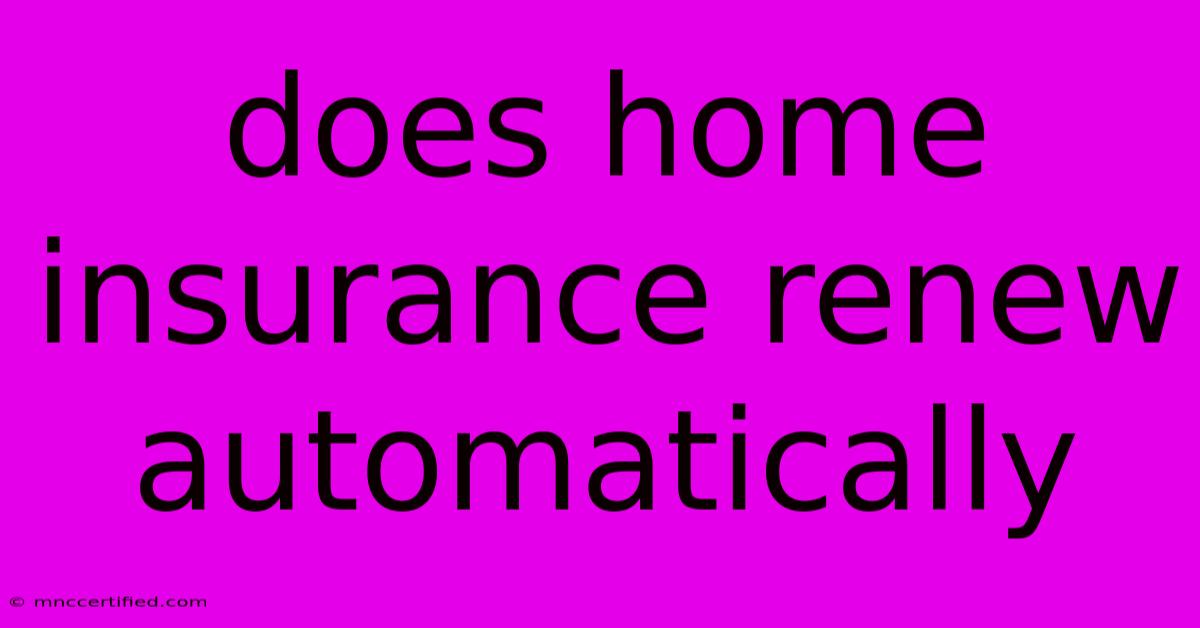Does Home Insurance Renew Automatically

Table of Contents
Does Home Insurance Renew Automatically? A Guide to Understanding Your Coverage
Home insurance is a vital financial safety net, protecting your property and belongings from unforeseen events like fire, theft, or natural disasters. But have you ever wondered what happens when your policy expires? Does it renew automatically, or are you left vulnerable without coverage?
This article aims to provide a clear and comprehensive answer to the question: does home insurance renew automatically? We'll explore the common practices, potential risks, and steps you can take to ensure your home is always protected.
The Automatic Renewal Landscape
While the exact process varies depending on your insurance provider and state laws, home insurance policies often automatically renew. This means that unless you actively take steps to cancel or make changes, your coverage will continue for another term.
Here's how the automatic renewal process typically works:
- Renewal Notice: You'll receive a notification from your insurer a few weeks before your policy's expiration date, outlining the new premium amount and any changes to coverage.
- Automatic Renewal: If you don't inform your insurer of your intention to cancel or change your policy, it will automatically renew.
- Premium Payment: You'll be expected to pay the new premium within the designated timeframe. If you don't pay, your coverage may be suspended or canceled.
Why Automatic Renewal Might Not Be Ideal
While convenience is the main advantage of automatic renewal, there are a few potential downsides to consider:
- Premium Increases: Your premium could increase significantly when your policy renews, potentially making your coverage unaffordable.
- Policy Changes: Your insurer might make changes to your coverage terms or conditions, which you might not be aware of if you don't review the renewal notice carefully.
- Missed Opportunities: You might miss out on better rates or more suitable coverage from other insurance providers if you automatically renew without exploring your options.
Protecting Yourself: Taking Control of Your Renewal
To avoid potential pitfalls and ensure your home is adequately protected, it's crucial to be proactive about your home insurance renewal. Here are some key steps:
1. Review Your Renewal Notice Carefully:
- Don't simply glance at the new premium. Carefully analyze any changes to coverage, deductibles, and other terms and conditions.
2. Shop Around for Better Rates:
- Contact other insurance providers to compare quotes and see if you can secure more affordable or comprehensive coverage.
- Use online comparison websites to streamline the process and easily compare different quotes.
3. Consider Your Coverage Needs:
- Evaluate if your current coverage is still adequate, especially if you've made significant changes to your home, such as renovations or additions.
- Update your coverage if necessary to reflect your current needs and assets.
4. Communicate with Your Insurer:
- If you plan to cancel or make changes to your policy, inform your insurer in writing well before the expiration date.
- Clearly communicate your intentions and ensure they receive your request in a timely manner.
Conclusion
Home insurance renewal can be a seamless process if you understand the automatic renewal mechanism and stay proactive. By reviewing your renewal notice carefully, shopping around for better rates, and communicating effectively with your insurer, you can ensure your home is adequately protected without falling victim to unexpected premium increases or coverage changes. Remember, being informed and proactive is key to securing the best possible home insurance coverage for your needs.

Thank you for visiting our website wich cover about Does Home Insurance Renew Automatically. We hope the information provided has been useful to you. Feel free to contact us if you have any questions or need further assistance. See you next time and dont miss to bookmark.
Featured Posts
-
Insurance Company Wont Pay Storage Fees
Nov 08, 2024
-
Free Breast Milk Bags Through Insurance
Nov 08, 2024
-
Is Cbct Scan Covered By Dental Insurance
Nov 08, 2024
-
Lorry Driver Dies In M6 Hgv Crash
Nov 08, 2024
-
Watch Galatasaray Vs Tottenham On Tv Tonight
Nov 08, 2024